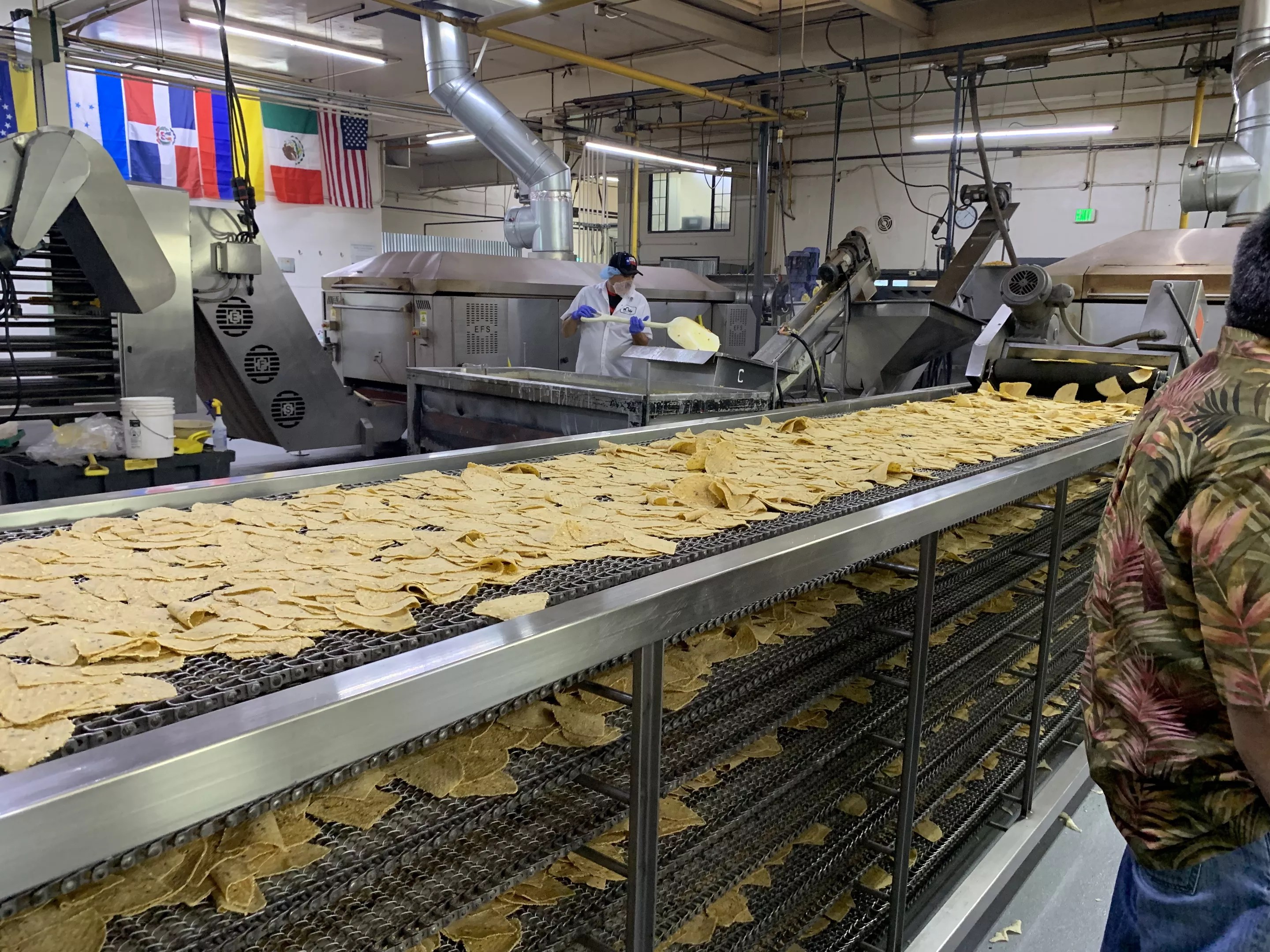
Helen Xu

Audio By Carbonatix
The typical tortilla chip is bland, serving as a blank canvas for whatever dip you’re shoving into your mouth. But at Raquelitas, the tortilla is the star, and its newly released green and red chile tortilla chips make that clear. “I call [the green chile chips] the sister who’s just a little spicy – she’s just a little angry,” says Rich Schneider, the company’s self-proclaimed tortilla savant. “But [the red chile chips], this sister is extremely angry!”
The heat in the green chile chips is subtle enough that it allows the flavors of roasted Pueblo chiles, mixed with jalapeños, onions and spices, to come through. The red chile tortilla chips hit you immediately with an intensely smoky taste from smoked Chimayo chiles, and the burn builds slowly – so much so that I found myself wheezing after downing a handful in Raquelitas’ RiNo factory warehouse with no water in sight.
Although Raquelitas has been around for decades, its name may be unfamiliar to some. It exclusively sells its products wholesale, and is one of the biggest suppliers of tortillas and tortilla chips to Colorado restaurants. While the company makes its money from selling tortillas, its story is built on being local, sustainable and ethical – something it’s done since before those ideas became mainstream.
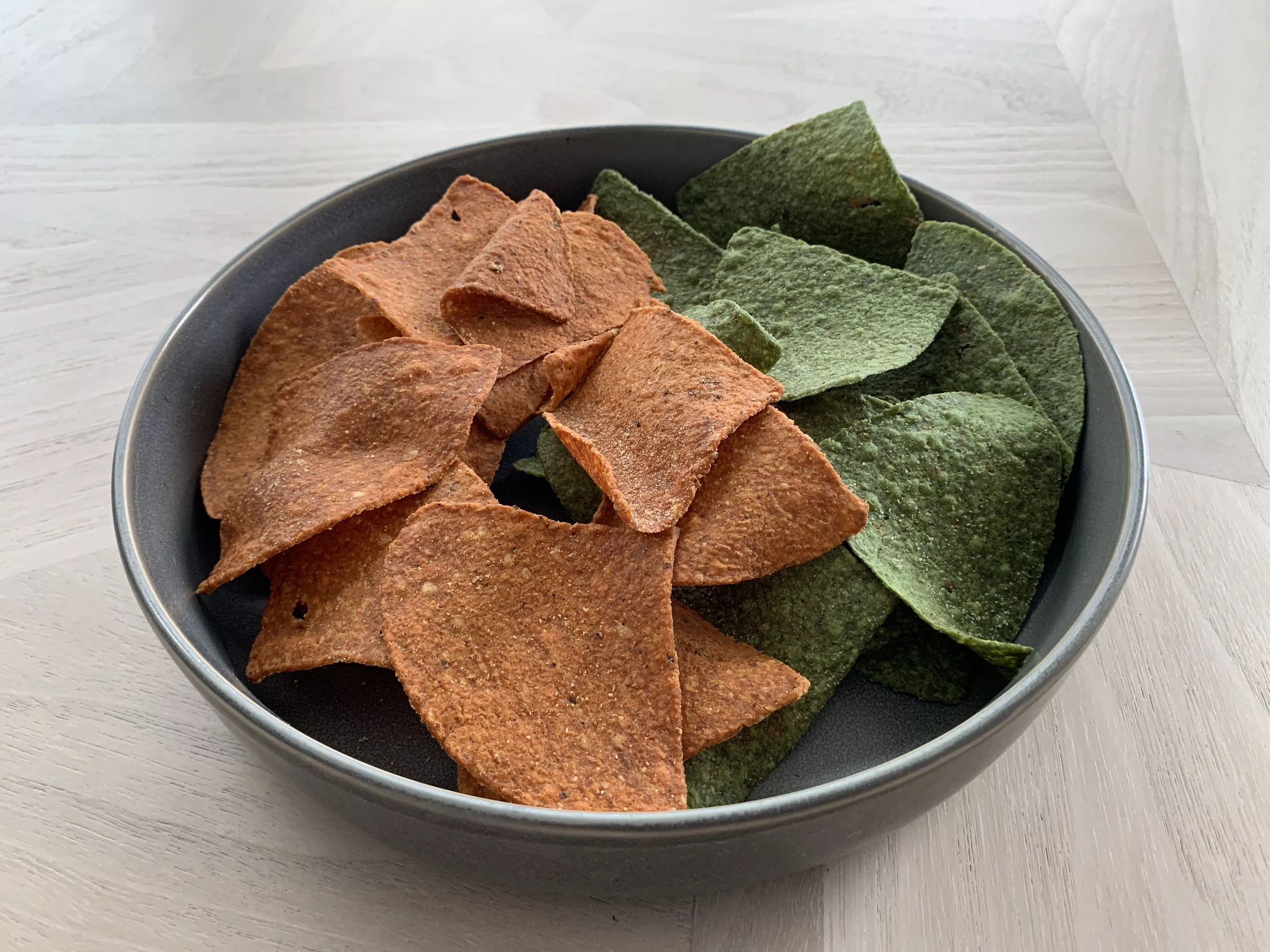
Red and green chile chips are the latest new addition to the Raquelitas lineup.
Helen Xu
All Raquelitas boxes proudly state, “Now energized with 100 percent wind electricity.” The RiNo factory uses LED bulbs and high-efficiency motors to use less electricity. It also recycles 98 percent of paper, requires 78 percent recycled content in its boxes, and partners with Aspen Oil Recycling to turn 4,000 pounds of frying oil per month into biodiesel. It is currently exploring using Xcel solar power and composting its food waste, as well.
But it wasn’t always this way. In 1959, Salvador De La Torre and his wife purchased La Popular, a small shop at Larimer and 19th streets, where they sold tamales, baked goods and tortillas. When a Duffy’s Delicious Drink soda factory went up for sale down the street in 1974, De La Torre saw an opportunity. He purchased 3111 Larimer Street for $100,000 and started to build out La Popular’s wholesale tortilla business.
Schneider, who has been close friends with De La Torre’s son, Raul, since he was sixteen, went to work at the factory right after high school. Now Raul is the president of Raquelitas, and his wife, Mari, is vice president. Schneider and Raul remain so close that in casual conversation, Schneider will often refer to Raul as his brother and Salvador as his father.
By 1982, Raul and Schneider were struggling to make ends meet. Their landlord had just raised the rent on the apartment they shared, and in a moment of desperation, they asked Salvador for a $25-per-week raise each. Looking to teach the boys a hard lesson, Salvador told them that if they wanted more money, they could take over running the plant while he went back to the shop.
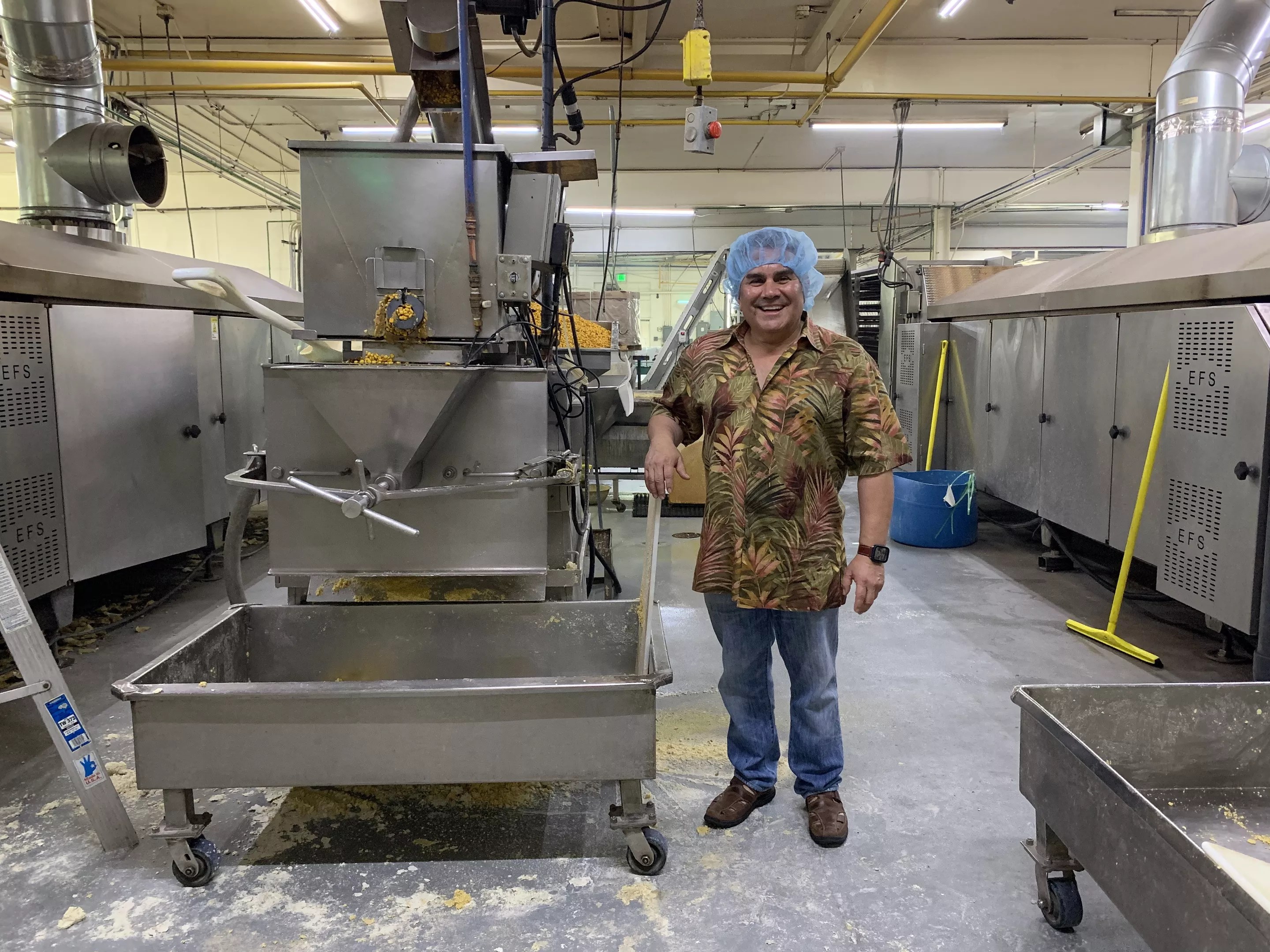
Rich Schneider inside the Raquelitas factory in RiNo.
Helen Xu
It was a big challenge. In Denver at that time, Mexican cooking was less common than it is now, and Raul and Schneider had to teach local restaurateurs how to make breakfast burritos, tacos and nachos. Nevertheless, they persevered, and in 1985, they changed the company’s name to Raquelitas in honor of Raul’s daughter, Rachelle.
By the 1990s, Raquelitas had grown large enough to attract the (unwanted) attention of larger competition. In an effort to stifle Raquelitas, those larger companies started to buy out suppliers. “I always put it like this: if you’re the world’s largest trucking company and you want to put other trucking companies out of business, then buy the gas stations and don’t sell them gas,” explains Schneider. “You don’t need to compete with them on price per pound; just make it so they don’t have fuel to run the truck. And that’s what started happening with big food companies buying out our suppliers.”
In order to survive, Raquelitas shifted to working with smaller, local farms to source its corn and wheat, which increased the quality of its tortillas. “I don’t know if the general public really realizes that [Colorado State University] has greatly helped Colorado’s wheat farmers grow a much better wheat,” says Schneider. The company also switched its sunflower oil supplier to Lamar-based Colorado Mills, which produces high-oleic sunflower oil that is non-GMO and zero-waste, and works with local farmers to grow 25,000 acres of sunflower seeds.
However, the changes also increased the prices of the company’s tortillas. After receiving pushback from its customers, Schneider went in person to each restaurant, explaining the benefits of the higher-quality ingredients and convincing them to keep buying Raquelitas products.
Today the company purchases Colorado-made ingredients whenever possible. Its non-GMO heirloom yellow corn comes from Bow & Arrow Farm, which is located at the base of Sleeping Ute Mountain between Four Corners Monument and Mesa Verde National Park. It is owned by the Ute Mountain Ute tribe and employs tribe members as an alternative to working at the local casino. “When you have ingredients like this, how can you not respect it?” says Schneider.
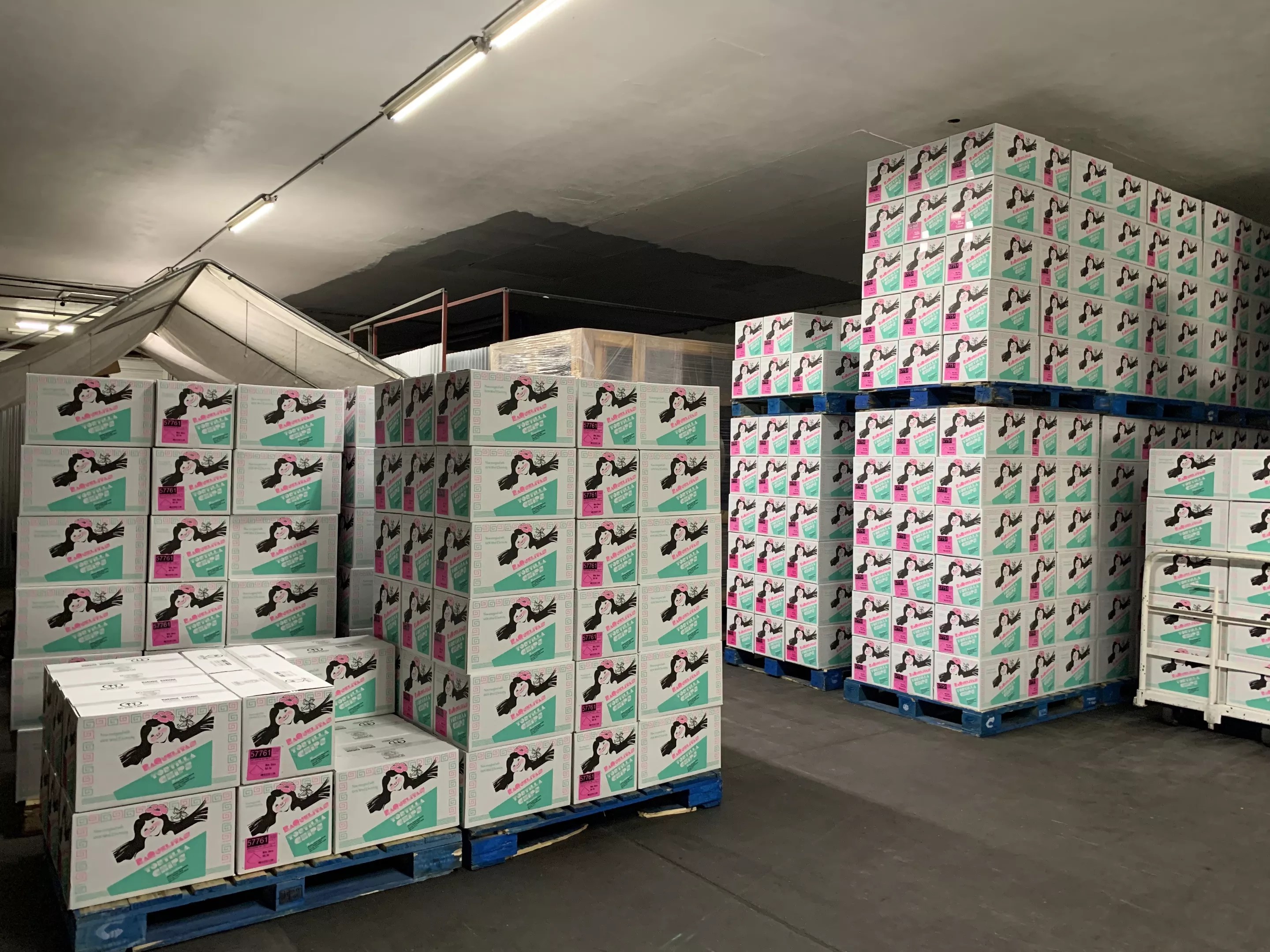
Raquelitas only sells its products wholesale.
Helen Xu
Raquelitas takes great pride in continuing to produce its tortillas using the traditional method, which starts with whole corn kernels that are milled between two large lava stones, resulting in a coarse, wet masa mix. The popular alternative at other tortilla factories is to use masa harina instead of fresh corn.
The company’s devotion to staying local extends to its partners and distributors, as well. For the new green and red chile chips, Raquelitas purchases roasted chiles from Pueblo’s Musso Farms. After they’re made, the chile chips are sent to the family-run Garza Farms in Calhan. Because the Raquelitas factory is set up solely for wholesale, it partners with businesses like Garza to break down its bulk bags into family-sized packaging that is now being sold at various farmers’ markets.
Schneider says the partnership with Garza Farms was sealed with a handshake after he visited its operation and saw how it provided employment opportunities in a part of Colorado where there are very few career options. Currently, Garza employs sixteen people, and “it’s literally an army of little old ladies in Calhan, and they’re packing, bagging and sealing the bags,” Schneider says. “And their checks were bigger last week because they worked more hours packing our chips.”
“I can’t keep the chips around, honestly,” says owner Chris Garza. “We’ve already sold four or five pallets in less than three weeks, and Rich has always been willing to help. We went down to the plant; they showed us around and showed us how everything’s made so that we convey that with our sales team to our customers.”
Now there’s talk about converting some of the seasonal workers at Garza Farms to year-round because of the demand for the chile chips. “Raquelitas offers us another outlet for another revenue stream that I can keep people working. Without it, I’d have to let them go,” explains Garza.
Denverites can pick up a bag of the chips at the Garza Farms stand at the South Pearl Street Farmers Market on Sundays. The products have also started making their way into restaurants. Barbecue pit master and caterer Jeff Gebott was one of the first to receive a batch of green chile chips, which he used in nachos. Gringos Tacos, which recently took over the kitchen at the Mercury Cafe, served them at its grand opening.
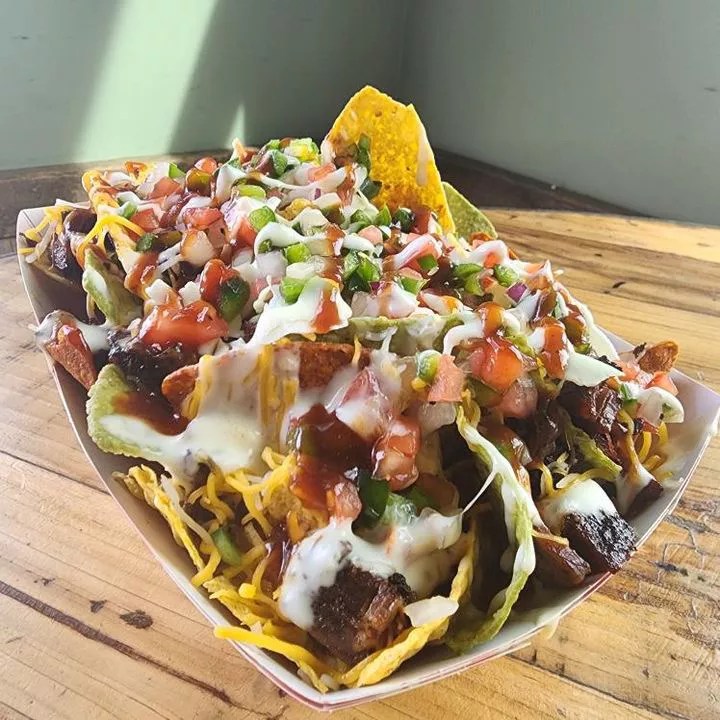
Nachos made with Raquelitas’ green chile chips.
Jeff Gebott
Where you won’t find them is on the shelves at national grocery store chains. “If we sold to places like King Soopers, I would never talk to a thousand people that bought the product. Selling to restaurants through distributors, I hear back; I get feedback immediately. It’s almost like a musician. They go into a sound studio, and when the album gets released, they have no idea who bought the album or who’s hearing it,” explains Schneider. “If they’re doing a concert, they see the faces, they hear the clapping. And that’s why we prefer our way.”
The company’s approach to business and local sourcing doesn’t always make good financial sense, but Raquelitas doesn’t want to be a low-cost leader. “Look, it’s an investment,” Schneider says. “We write these bigger checks, and is that an investment in how people view our brand? Absolutely.” The company’s efforts have been recognized by growers and restaurateurs statewide, and Schneider has consulted for the Colorado Department of Agriculture on how other businesses can replicate Raquelitas’ local-first business model.
Above all, chefs love Raquelitas for its delicious, innovative flavors. Schneider says it provides tortillas and chips to thousands of restaurants. It makes purple-hued hibiscus chips for My Neighbor Felix; sells bags of its Mothership chips at Meow Wolf; provides exclusive corn tortilla strips for the Broadmoor’s room service; makes Nachos Borrachos chips using spent grain from Tommyknocker Brewery for various breweries; and more. Chances are, if you dine out in Colorado, you’ve eaten Raquelitas products many times.
“We’re a little weird,” Schneider concludes. “We’re a weird business, but I know our dad would want us to do this the right way.”